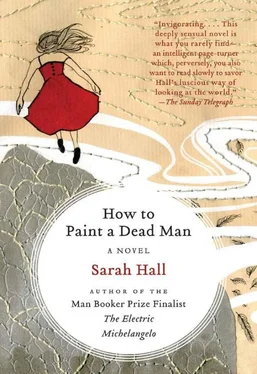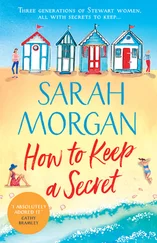Sarah Hall - How to Paint a Dead Man
Здесь есть возможность читать онлайн «Sarah Hall - How to Paint a Dead Man» весь текст электронной книги совершенно бесплатно (целиком полную версию без сокращений). В некоторых случаях можно слушать аудио, скачать через торрент в формате fb2 и присутствует краткое содержание. Год выпуска: 2009, Издательство: Harper Perennial, Жанр: Современная проза, на английском языке. Описание произведения, (предисловие) а так же отзывы посетителей доступны на портале библиотеки ЛибКат.
- Название:How to Paint a Dead Man
- Автор:
- Издательство:Harper Perennial
- Жанр:
- Год:2009
- ISBN:нет данных
- Рейтинг книги:4 / 5. Голосов: 1
-
Избранное:Добавить в избранное
- Отзывы:
-
Ваша оценка:
- 80
- 1
- 2
- 3
- 4
- 5
How to Paint a Dead Man: краткое содержание, описание и аннотация
Предлагаем к чтению аннотацию, описание, краткое содержание или предисловие (зависит от того, что написал сам автор книги «How to Paint a Dead Man»). Если вы не нашли необходимую информацию о книге — напишите в комментариях, мы постараемся отыскать её.
, Sarah Hall, "one of the most significant and exciting of Britain's young novelists" (
), delivers "a maddeningly enticing read... an amazing feat of literary engineering" (
).
How to Paint a Dead Man — читать онлайн бесплатно полную книгу (весь текст) целиком
Ниже представлен текст книги, разбитый по страницам. Система сохранения места последней прочитанной страницы, позволяет с удобством читать онлайн бесплатно книгу «How to Paint a Dead Man», без необходимости каждый раз заново искать на чём Вы остановились. Поставьте закладку, и сможете в любой момент перейти на страницу, на которой закончили чтение.
Интервал:
Закладка:
You’ve been wondering lately when the moment is that somebody is truly lost to you. For example, when will Nicki’s family finally give up hope and switch off the machines? She lies there, day after day, as she has for years, living by medical proxy, her hair glossy as conkers, electrically retrograde behind her skull. You still visit her when you are home. You’ve got used to it — being chatty and fey, nothing but the sound of your voice in the room and the soft flushing of the ventilator. You tell her what is going on in the world, wondering if she has any notion what year it is now. After the nurses leave her room, you ask her to wake up. There is never a response. You whisper down into her ear. It’s like making a confession to the oblivious ground, or blowing across the top of an empty bottle.
Her sisters send you Christmas cards each year on her behalf — the secretarial custodians of Nicki’s half-life. How could they know if a week after The Decision was made — after they had brushed her hair and changed her nightgown a last time, and told her goodbye we love you darling girl —that this was not the week she was due to sit up, finally, and ask what she got for her A level history, say she fancied a Rich Tea biscuit, and wonder if her boyfriend Andy had been in to see her. Only to find out the prick had married her younger cousin, a year after she went under.
The doctors measure her brain activity. From time to time there are electrical spikes, heat blooms. There’s no way of knowing how aware she is, what she is hearing, what she is feeling. The doctors say the green flares might be dreams. They say: don’t dismiss her existence in case she is trapped within herself. Her spirit rattling around mutely, like a pea in a dead whistle.
On your fifth date you told Nathan about Nicki, about what happened when you were teenagers. You were in a café on Betterton Street. There was a plate of cheese on the table in front of you, a basket of bread, two glasses of red wine. Downstairs there was a reading going on. Every few minutes you could hear thin choppy clapping, like the clapping at a village cricket match. His face fell. I know it’s sudden, but I love you, will you marry me? It was as if it was you who had survived near-death in the winter snow, as if the true miracle was that you were sitting there eating cheese, and it was vital that he ask you.
He reached over and put his hands behind your neck, and in doing so caught a finger in your hair-band and pulled out your ponytail. It was an awkward moment. Your hair spilled forwards. He kissed you. You said nothing. There was silence for a while, then sporadic clapping. He has never asked again. He was hurt, you’re sure. But you kept going out, regardless. You became comfortable, dependent, you enjoyed mutually satisfying sex. You cooked fresh pastas in the evenings, slept against each other’s backs, holidayed abroad. Then you moved in together. You upgraded from two shared suburban houses with fox-skunked gardens to one stylish sky-lit conservation-area flat, right by the heath.
Here, you have domestic security. The mortgage goes out by standing order; sensibly you pay more than the interest every month. Laundry collects in a wicker hamper and is regularly washed. The floors are slick, dust-free; in the cupboard is one of those click-together devices to sweep, with detachable cloths that attract cobwebs like magic. Ladles and spoons live in the second down of four fitted pine drawers, below a sophisticated granite counter. Everything in the flat is ordered, utilised, pleasing. The second bedroom, with its expensive pro-photo lighting rig, umbrellas and snoots, serves as a small studio. The bathroom, a makeshift darkroom. You like to develop yourself, check temperatures, make timings; you’re old-school. You still work with film whenever you can. You like the bursting shutter, the winding motor, the choice of lens. None of the equipment has recently been used.
There is a roll of film in the bottom-loading rangefinder, your first decent camera, which contains Danny. He is sitting on a bench in the train station, surrounded by pigeons, on his last visit to London.
Over the last few weeks you haven’t been spending much time at home. You’ve been at Borwood House organising the new exhibition, or out running on the heath. You’ve been going up north to see your mum and dad, to make sure they are managing OK. A few times you’ve gone into the city to meet your lover, in the bars in Soho, or by the lock. Once the two of you went to a club down a flight of stairs in Shoreditch with an entry fee and dark letterboxed rooms. Afterwards you fell upon each other in the church grounds nearby. A few times you’ve used a hotel. You let him undress you, and put pillows beneath your stomach. You watched the local movement of his hips and waist in the mirror opposite the bed. You were hurried and left your phone switched on. The ringing didn’t stop you. Afterwards there were messages from Nathan, which you deleted.
In the beginning things were fine with Nathan, and you felt happy. You used him as a muse. You photographed him, exhibited the prints, exposed him to the scrutiny of the public. He was good-humoured, sat for you nude, let you manipulate his poses. His body was interesting; he wore his muscles tautly against his skin. You got right into the polished crevices, the brackish ghylls. He was the subject of your most acclaimed series of compositions, which was short-listed for a major prize, and widely reviewed. The press compared you to your father, talked about geo-portraiture. There was talk of fetishes. Reviewers wondered whether this was a response to the legacy of Peter Caldicutt, whether you were trying to be difficult and controversial.
Once, when you were shooting the series, you put Nathan in your best tie-top stockings. Agent Provocateur. The hairs of his legs broke through the black mesh and his muscles gave the material an interesting look. It excited you both, and you went to bed and didn’t speak, but instead took turns doing whatever you wanted, with urgency and experiment. You tried it again a few more times, but the eroticism lessened, then failed, and you stopped.
The two of you are different now, calmer. There is still sex, occasionally, but it is no longer a priority to seduce or be seduced by him. You recognise him more as a housemate, a person who becomes gently furious at the news every night, a decent cook. All the powers you have for capriciousness, all the potency you wield-and you do wield it, with dark sedge eyes, good legs, the ability to turn male heads on entering a room, and talent — seem superfluous to the dynamic of the relationship now. You still bring him tea every morning, and comfort his headaches with paracetamol. You are generous with birthday presents. But there’s no entitlement to your body any more, granted through arduous solicitation, an obvious hard-on when you undress. Now you wear your best lingerie to work, the silk dampening, the lace cuffs stiff under your dress. Your mind tracks to someone else when you touch yourself, and you think of that time in the churchyard, his mouth nuzzling against your soaked underwear, the desperate thrusts. At night sometimes the ache becomes unbearable. You leave the room where Nathan is sitting reading or watching television. You OK, Suze? he calls. To leave a room abruptly might still mean a sharp descent into sorrow. You say you’re fine, just going to the bathroom. You lock the door; lean forward against the cold mirror. You feel down inside your bra, unfasten however many buttons on your jeans you need to.
The first time it happened was at Borwood House. You’d been thinking of Danny. You were downloading the certificates of objects that are being sent to the gallery for the new exhibition-the odd little artefacts that once belonged to the great twentieth-century painters and are somehow relevant to their legacies. Angela had just decided on a title for the show: In the Artist’s Shoes . She had gone to buy you both coffees from the café on the heath to celebrate, and you were thinking about Danny, about the red trainers he always wore, like a man ten years younger, like a boy. He had multiple pairs. For a moment you thought about crying. You knew it would make you feel better, but the distance to the emotion seemed too far to travel.
Читать дальшеИнтервал:
Закладка:
Похожие книги на «How to Paint a Dead Man»
Представляем Вашему вниманию похожие книги на «How to Paint a Dead Man» списком для выбора. Мы отобрали схожую по названию и смыслу литературу в надежде предоставить читателям больше вариантов отыскать новые, интересные, ещё непрочитанные произведения.
Обсуждение, отзывы о книге «How to Paint a Dead Man» и просто собственные мнения читателей. Оставьте ваши комментарии, напишите, что Вы думаете о произведении, его смысле или главных героях. Укажите что конкретно понравилось, а что нет, и почему Вы так считаете.












